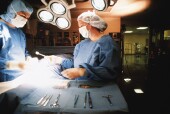- The Best Time of Day to Drink Bone Broth to Maximize Health Benefits
- 8 Ways to Increase Dopamine Naturally
- 7 Best Breads for Maintaining Stable Blood Sugar
- Gelatin vs. Collagen: Which is Best for Skin, Nails, and Joints?
- The Long-Term Effects of Daily Turmeric Supplements on Liver Health
- Could Your Grocery Store Meat Be Causing Recurring UTIs?
- Are You Making This Expensive Thermostat Error This Winter?
- Recognizing the Signs of Hypothyroidism
- 10 Strategies to Overcome Insomnia
- Could Artificial Sweeteners Be Aging the Brain Faster?
Hernia Repair Recovery Often Longer Than Expected


People who undergo surgery to repair an abdominal hernia may underestimate how long their recovery will take, new research indicates.
Hernia surgery involves closing a gap that has formed in the muscle walls of the abdomen. This common procedure is needed to treat pain or obstructions that occur when organs or soft tissue push through this muscle opening.
Although patients who have a hernia repaired using minimally invasive technology often expect to return to their normal daily routine quickly, a study found many of these people still feel pain and fatigue for up to a week after their procedure.
“It may be that people expect, when they’ve seen their neighbors after laparoscopic gall bladder surgery and they’re back taking a walk the next day, that they’ll be able to do the same thing with laparoscopic ventral hernia repair,” said study senior author Dr. Juliane Bingener-Casey, a gastroenterologic surgeon at Mayo Clinic in Rochester, Minn. “They will probably find out that it takes several days before they start moving the way they usually do.”
In conducting the study, scheduled for presentation Thursday at the Society of American Gastrointestinal and Endoscopic Surgeons’ annual meeting in Salt Lake City, the researchers examined the quality of life of 18 patients in the week following hernia surgery. They found that after surgery, the amount of fatigue and pain reported by the patients did not lessen to pre-surgery levels until seven days after the procedure. Longer recovery times were more common among women and those younger than 60, according to a society news release.
The researchers suggested that doctors should make sure their patients know what to expect during recovery. Having more realistic expectations will help patients cope with the pain and fatigue they may experience after their operation, they said.
“It’s worse than expected for the patients, probably. So I think it’s important for patients to have a realistic expectation, so they’re not surprised and disappointed,” Bingener-Casey said in the news release. “For the surgeons, it’s important to look at what we can do to improve recovery. Is it the pain control, is there other help we can provide to get through the pain or through the fatigue for the time after surgery?”
About 90,000 laparoscopic ventral hernia repairs are performed in the United States each year.
Research presented at meetings is typically considered preliminary because it hasn’t yet been published in a peer-reviewed journal.
More information
The U.S. National Institutes of Health provides more information on hernias.
Source: HealthDay
Copyright © 2026 HealthDay. All rights reserved.










